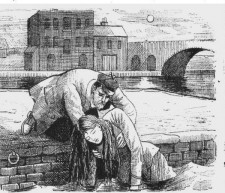-
About Us
Canal Boatmen Family History
Boatmen in the news
Newspapers -Staffordshire
More from Staffordshire
Newspapers - Warwickshire
Newspapers - Birmingham
Newspapers - Leicestershire
Newspapers - Derbyshire
Newspapers - Nottingham
Newspapers - Cheshire
More from Cheshire
Newspapers - Northants
Newspapers - Lancashire
Newspapers - Manchester
Newspapers - Liverpool
Newspapers - Yorkshire
Newspapers - Worcestershire
Newspapers - Gloucestershire
Newspapers - Shropshire
Newspapers - Oxfordshire
Newspapers - Wales
Newspapers - Essex
Newspapers - Kent
Newspapers - London
Censuses
Parish register extracts
Other useful stuff
Contacts, names and photos
Contact
Links
London
When searching for newspaper articles in the London papers, I have included any about the Watermen and Lightermen who worked on the Thames. If your ancestor was a Waterman or Lighterman, the apprentice bindings are available on the "Find My Past" website (pay to view) or in CD form from the parishregister website (details on the links page). All licensed Watermen and Lightermen had to serve a seven year apprenticeship to become qualified to navigate the Thames. Like canal boatmen, the trade tended to run in families, so the bindings can be very useful for tracing the family tree. At the censuses, the men were often on board their boat and were counted separately from their wives and children, which, like the boatmen on the canals, can make them more difficult to trace.
l 
For anyone interested in London canals, take a look at www.lndn.blogspot.co.uk, which describes a walk along the Regent's Canal.

Articles from the Illustrated Police News, dates 1867 to 1889.
The major articles in thie first selection, from September 1878, concern the collision in the Thames between the Princess Alice, a pleasure steamer, and the much larger Bywell Castle, a screw steamer. The Princess Alice was returning from a pleasure trip to Gravesend, with over 600 passengers on board, when she was hit amidships by the Bywell Castle, sinking within a few moments. The scale of the disaster is difficult to imagine. One of the first on the scene, Charles Handley of Gravesend, the captain of the barge Chance, describes it thus :- "The whole river seemed alive with heads and hair. It looked like a river full of coconuts".
By the 14th of September, 426 bodies had been recovered from the Thames, with more still being found.
A number of the boating fraternity took to the ring as boxers, and reports of their fights make it clear why the Queensbury Rules were needed, as punters who had backed the losing boxer sometimes invaded the ring, and a free for all ensued. One classic trick was to cross the Thames to get away from the police, as recorded in the Gravesend Reporter of Saturday October 13th 1860.
PRIZE FIGHT Again on Monday last the village of Purfleet was enlivened by the arrival of about 200 of the sporting fraternity, some of whom were inclined to commence hostilities there, were it not for the presence of PC Diveney of the Essex Constabulary, who is always on the alert, and to whom a great many of the fancy are known. So, seeing there was no chance of their little affair coming off there, they took to the boats and crossed over the river, where the non appearance of the blues gave them an opportunity of pitching their ring at Long Reach, where a mill commenced between Jerry Hawkes and Jack Owens, for ten sovereigns. They fought 68 rounds in one hour and 58 minutes, Hawkes proving himself the better man. In the same ring was a battle between Macarthy and Dutton for a tenner. They fought 52 rounds, which lasted 63 minutes, when Macarthy was declared the winner. After which the combatants and their friends recrossed the river and proceeded to town, seeming well pleased at not being disturbed by the Philistines.
